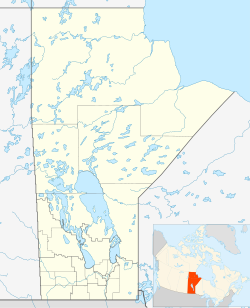Pierson is an unincorporated community recognized as a local urban district[2] located in the Municipality of Two Borders in southwestern Manitoba, Canada. The Antler–Lyleton Border Crossing is located south of Pierson.
Pierson | |
|---|---|
 Welcome sign in Pierson, still indicating the RM of Edward. | |
Location of Pierson in Manitoba | |
| Coordinates: 49°10′48″N 101°15′45″W / 49.18000°N 101.26250°W | |
| Country | Canada |
| Province | Manitoba |
| Region | Westman |
| Rural Municipality | Municipality of Two Borders |
| Government | |
| • MLA | Doyle Piwniuk |
| Area | |
• Total | 1.94 km2 (0.75 sq mi) |
| Elevation | 253.6 m (832 ft) |
| Population | |
• Total | 174 |
| • Density | 90/km2 (230/sq mi) |
| Time zone | UTC-6 (CST) |
| • Summer (DST) | UTC-5 (CDT) |
| Area code | 204 |
Pierson is home to the Carnival of Crafts which averages an attendance of 1,700 people. This event takes place at the Edward Sports Centre on the first Saturday in October.[citation needed]
Demographics
editIn the 2021 Census of Population conducted by Statistics Canada, Pierson had a population of 174 living in 85 of its 106 total private dwellings, a change of -8.4% from its 2016 population of 190. With a land area of 1.94 km2 (0.75 sq mi), it had a population density of 89.7/km2 (232.3/sq mi) in 2021.[1]
Climate
editPierson has a humid continental climate (Dfb) with great differences between summer and winter. The regime is typical of southern Manitoba, the northern edges of North Dakota and the surrounding border region.
| Climate data for Pierson | |||||||||||||
|---|---|---|---|---|---|---|---|---|---|---|---|---|---|
| Month | Jan | Feb | Mar | Apr | May | Jun | Jul | Aug | Sep | Oct | Nov | Dec | Year |
| Record high °C (°F) | 8.9 (48.0) |
17.5 (63.5) |
23.9 (75.0) |
34.0 (93.2) |
39.4 (102.9) |
41.7 (107.1) |
42.8 (109.0) |
40.0 (104.0) |
37.2 (99.0) |
33.0 (91.4) |
22.8 (73.0) |
17.2 (63.0) |
42.8 (109.0) |
| Mean daily maximum °C (°F) | −9 (16) |
−5.7 (21.7) |
0.9 (33.6) |
12.1 (53.8) |
19.1 (66.4) |
23.6 (74.5) |
26.7 (80.1) |
26.6 (79.9) |
20.2 (68.4) |
11.6 (52.9) |
0.5 (32.9) |
−7 (19) |
10 (50) |
| Daily mean °C (°F) | −14.2 (6.4) |
−11.0 (12.2) |
−4.2 (24.4) |
5.3 (41.5) |
11.9 (53.4) |
16.8 (62.2) |
19.6 (67.3) |
18.9 (66.0) |
12.9 (55.2) |
5.1 (41.2) |
−4.5 (23.9) |
−11.9 (10.6) |
3.7 (38.7) |
| Mean daily minimum °C (°F) | −19.5 (−3.1) |
−16.2 (2.8) |
−9.1 (15.6) |
−1.6 (29.1) |
4.7 (40.5) |
10.1 (50.2) |
12.3 (54.1) |
11.2 (52.2) |
5.6 (42.1) |
−1.4 (29.5) |
−9.4 (15.1) |
−16.8 (1.8) |
−2.5 (27.5) |
| Record low °C (°F) | −44.4 (−47.9) |
−47.8 (−54.0) |
−45.0 (−49.0) |
−26.1 (−15.0) |
−12.2 (10.0) |
−9.4 (15.1) |
−2.2 (28.0) |
−6.1 (21.0) |
−12.2 (10.0) |
−22.2 (−8.0) |
−33.3 (−27.9) |
−42.0 (−43.6) |
−47.8 (−54.0) |
| Average precipitation mm (inches) | 22.9 (0.90) |
13.9 (0.55) |
23.1 (0.91) |
27.5 (1.08) |
55.1 (2.17) |
77.7 (3.06) |
70.4 (2.77) |
51.6 (2.03) |
37.3 (1.47) |
33.2 (1.31) |
22.7 (0.89) |
21.9 (0.86) |
457.3 (18.00) |
| Source: Environment Canada[3] | |||||||||||||
External links
editReferences
edit- ^ a b "Population and dwelling counts: Canada and designated places". Statistics Canada. February 9, 2022. Retrieved September 3, 2022.
- ^ "Local Urban Districts Regulation". Government of Manitoba. April 23, 2016. Retrieved April 24, 2016.
- ^ "Canadian Climate Normals 1981-2010". Environment Canada.
